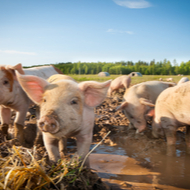NOAH welcomes future farming plan

The plan will focus on tackling endemic diseases in cattle and pigs.
Plans announced by Defra to invest in improving animal health and welfare have been welcomed by the National Office for Animal Health (NOAH).
On Monday (30 November), the Government published its 'Agricultural Transition Plan' outlining a new system for farming in England. Under the plan, farmers will be rewarded for providing higher standards of animal welfare and environmental protection measures.
Initially, the plan will focus on tackling endemic diseases in cattle and pigs. Welcoming the move, NOAH's chief executive Dawn Howard said the ambitions “echo those of NOAH’s Vision Paper” and will “deliver benefits in terms of welfare, productivity, sustainability and resilience of farms.”
“We are pleased to see a timetable for the Animal Health and Welfare Pathway for England,” she said. “However, disease knows no borders, and a key principle set out in our 2019 Vision paper is to encourage meaningful co-operation between the devolved nations, as they each take responsibility for the health and welfare of the animals."
She added: “NOAH will promote collaboration through its participation in groups such as the Ruminant Health and Welfare Group and look forward to working with DEFRA to help support delivery.”
NOAH’s Vision Paper proposes a holistic approach to improve livestock health, welfare and farm businesses, suggesting incentivisation of endemic disease control programmes and support for vaccination.
Dawn continued: “Vaccination is one key tool that can be used in the push to tackle endemic disease...They are vital tools that should be harnessed at a population level and implemented into the management protocols of all livestock farms, supporting them to be proactive and progressive and forming a part of each farm health plan.
“As DEFRA’s Transition Plan explains, this commitment to reduce disease will also help further support the industry’s already tremendous response to the challenge of reducing the need for antibiotics and hence continue to play our part in the fight against antimicrobial resistance."



 The Federation of Independent Veterinary Practices (FIVP) has announced a third season of its podcast, Practice Matters.
The Federation of Independent Veterinary Practices (FIVP) has announced a third season of its podcast, Practice Matters.